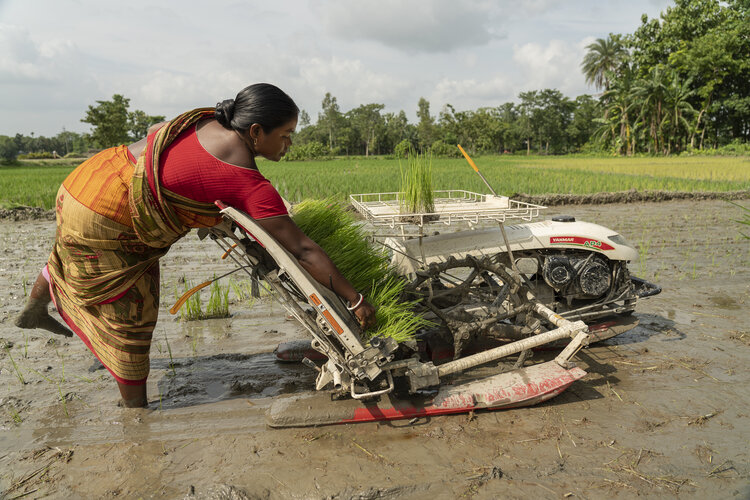Scaling Sustainable Farming Systems
Overview
Scaling of conservation agriculture based farming systems has been a key focus of several projects in ACIAR SDIP, forming the basis from which other research activities have been undertaken, and importantly providing links to farm level work. Key lessons for scaling include:
The need to promote and work with multi-stakeholder arrangements;
Groups continue to provide opportunities that are not possible for most individual smallholders to capitalise on; and
Effective field-policy links can result in convergence with government programs.

Scaling approaches
Conservation agriculture based sustainable intensification (CASI) approaches have been a key part of the SRFSI project, with a focus on understanding the science behind scaling. CASI farming practices increase productivity and farm incomes, reduce labour requirements and farm level water use, and have emission reduction benefits.
In total, around 120,000 farmers (25% female) are now using more productive, profitable and gender inclusive farming systems. The cumulative impacts of this adoption over the life of SDIP includes an estimated additional AUD $100 million in farm household income, 60,000 tonnes of CO2-e mitigated and 63,000 megalitres of water saved, and positive benefits for women in households using CASI. Importantly, CASI is now integrated into state government programs and policies in West Bengal, and will continue to scale without project support.
The SRFSI project took a multi-faceted approach to scaling, with different elements contributing to eventual success.
The initial phase focused on defining the evidence base for CASI through large-scale field trials, which underpinned high-impact scientific publications across a range of agricultural disciplines. Critically, these on-farm trials gave credibility to CASI with farmers, researchers and policy makers.
From the start of the project, strengthening links between different actors in local systems was a focus. Innovation Platforms (IPs) were proposed as a tool to catalyse adoption of CASI for smallholder farmers and generate opportunities for rural micro-entrepreneurship. IPs allowed widespread uptake of CASI with benefits to smallholder farmers, input and output suppliers, and enabled extension systems to be more efficient.
There was a focus on capacity development of individuals in potential change making organisations, which catalysed organisations to adopt pro-CASI agendas to support CASI scaling over the longer term. In total, more than 60,000 people received some form of training (approximately 30% women). These trainings were across a broad range of potential stakeholders including farmers, service providers, extension agents and policy makers.
Importantly, there was a sustained effort to align with government programs for sustainability.
Learning from scaling
Novel approaches have been implemented to learn from the scaling experience. This includes:
Applying structured qualitative assessments SRFSI implemented a huge qualitative survey to explore adoption dynamics, and with it proposed an amended and structured tool for qualitative research of farmer decision making.
Applying pathway analysis for adoption studies A unique pathways approach was taken to understanding the status of adoption, to go beyond binary adoption and to understand where populations lie on an ‘adoption continuum’. The results from a large quantitative survey are being used to understand the outcomes and impacts as a result of using CASI, and to inform scaling strategies in different locations.
Helping frame adoption processes and scaling discussions Though SRFSI a new adapted online version of Smallholder ADOPT was developed. Tools such as this will increase the potential impact of future interventions by enabling a structured evaluation of expected adoption outcomes and what can be done to increase outcomes.
Partnerships for commercialisation
The Pilot Project on Commercialisation of Small Holders’ Conservation Agriculture-based Planters in Bangladesh aims to promote small scale mechanisation of planting operations using CA practices. The ACIAR project links medium scale manufacturers, Banks, farmers organisations, and small entrepreneurs (local service providers, LSP) as partners whose aim is to enable the business of mechanised planting, and create demand for the VMP to reach a scale where no further specific public funding is needed. New and prospective LSP of VMP are being actively sought. The partnerships work together to help new LSP secure loans for purchasing machinery (VMP and/or Two Wheel Tractor, 2WT).
Two business models are being tested to create sales of the Versatile Multi-crop Planter (VMP) at a commercially viable scale. The most popular is a Planting Incentive Model which ensures business can be maintained for the first season while the technology is still unfamiliar to both farmers and the LSP ( the new VMP owners get a one-off payment). The second scheme involves a Tri-party Investment Model (a cost sharing arrangement between the LSP/farmer, bank loan and project support, with agreed acreage to be planted within two seasons to create demand).
The key enablers for successful LSP are the ability to sow non-rice crops, which has better business potential, and the need for year-round job assurance to retain experienced operators of the VMP. Co-investment support to the private sector for promotions, marketing, training and after sales services are critically important for successful commercialization.
Partnerships for planning and implementation
At the provincial level in Nepal, there is scope to help relevant actors to better coordinate to support sustainable mechanisation. In Province 1 and 2, local stakeholders worked together to produce participatory roadmaps, using a flexible planning technique to support strategic planning and programming (Roadmapping). This process explored the pathways for increased CASI mechanisation through a series of activities that aimed to improve linkages and capacity to create and maintain enabling environments.
The key elements of this process were building and strengthening relationships between key stakeholders, learning from mechanisation policy settings in the region, a focus on capacity development by co-location of engineering experts in provincial organisations, and application of a “roadmap” process that can provide step by step guidance for future application.
At the ACIAR SDIP Final Review, program team members Dr Rajendra Uprety, Dr Brendan Brown, Professor Apurba Chowdhury, Professor Richard Bell and Dr Sarina Macfadyen joined Eric Huttner for a discussion about their experiences in scaling sustainable farming system technologies. Watch a recording of the discussion here.